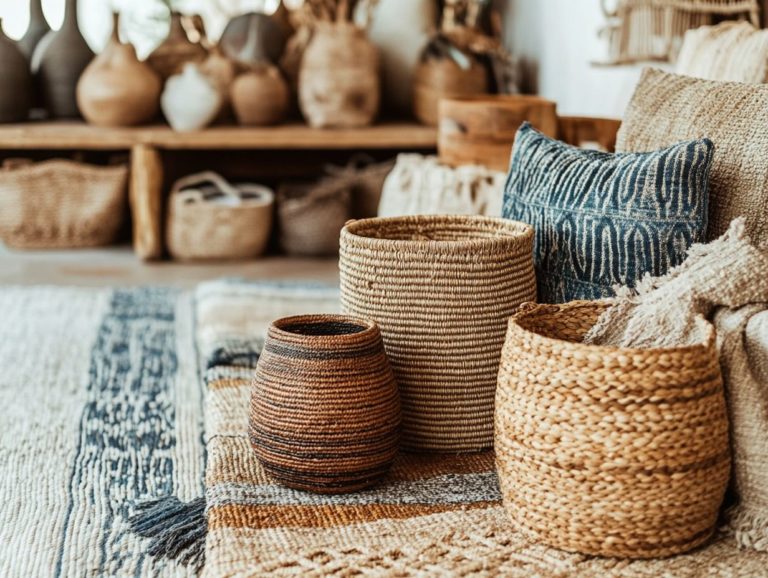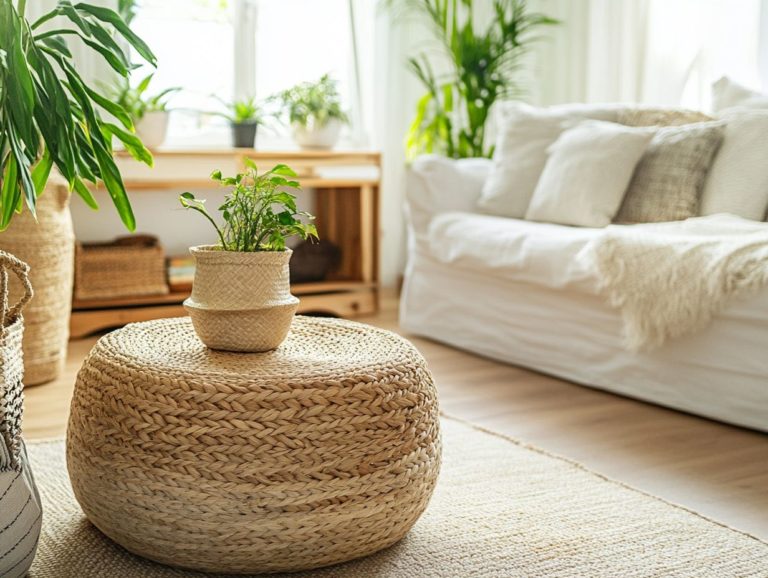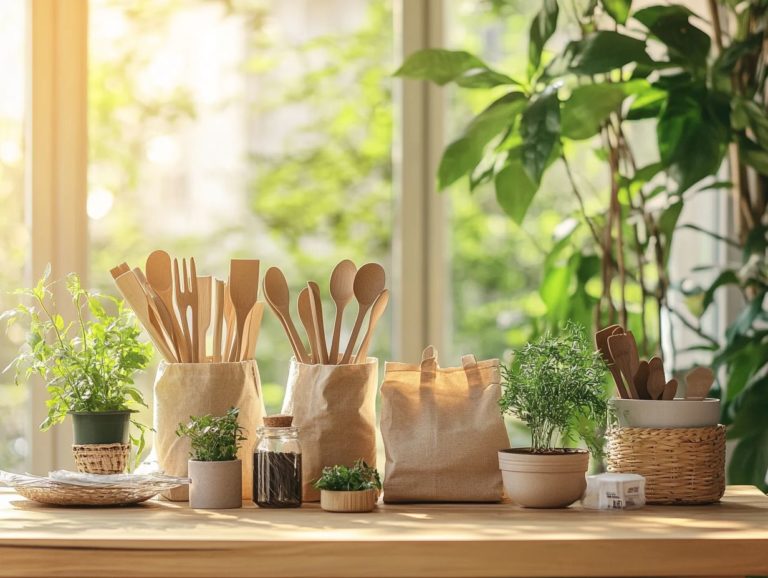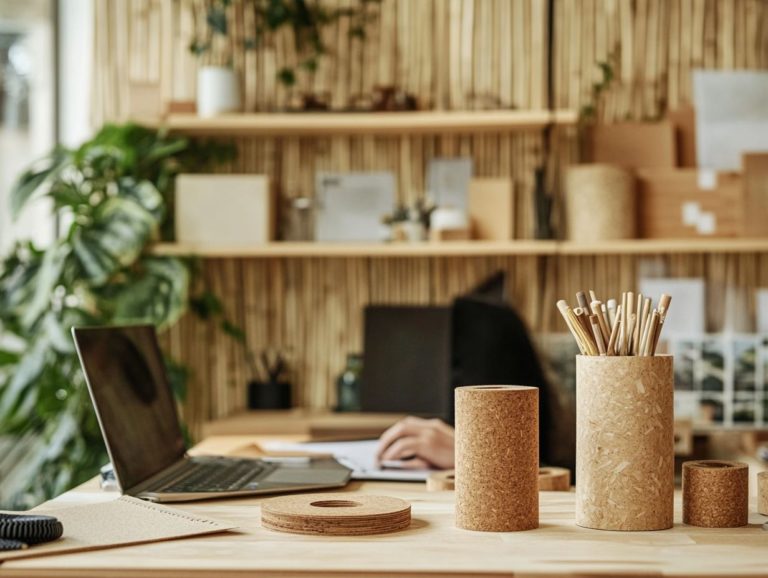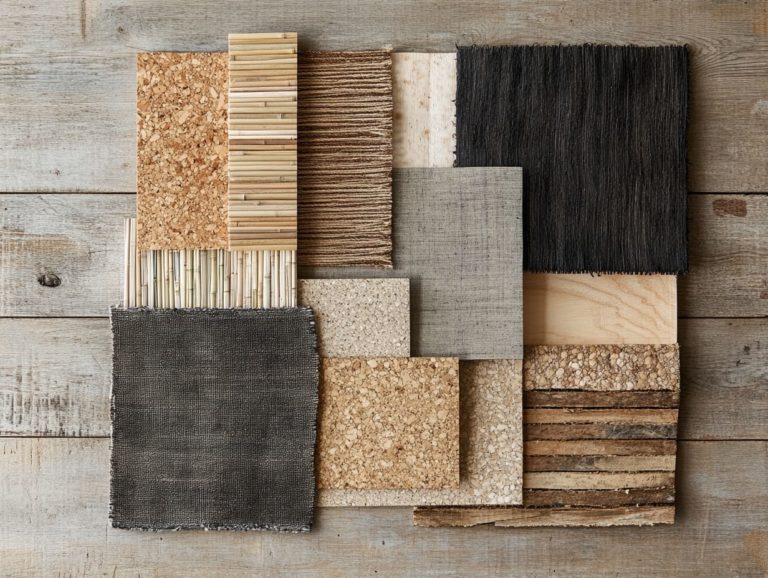5 Sustainable Materials for Modern Kitchen Accessories
Creating a sustainable kitchen not only helps the planet but also lets you express your unique style!
Consider the transformative power of five eco-friendly materials bamboo, cork, recycled glass, stainless steel, and reclaimed wood. Each option brings unique advantages, from durability to stunning aesthetics, all while minimizing your environmental footprint.
Explore how these materials can elevate your cooking space, ensuring it is both visually appealing and sustainably crafted.
Contents
- Key Takeaways:
- 1. Bamboo
- 2. Cork
- 3. Recycled Glass
- 4. Stainless Steel
- 5. Reclaimed Wood
- Why Should We Use Sustainable Materials in Our Kitchen?
- What Are the Benefits of Using Bamboo in Kitchen Accessories?
- How Can Cork Be Used in Kitchen Accessories?
- What Are the Advantages of Using Recycled Glass in Kitchen Accessories?
- Why Is Stainless Steel a Sustainable Choice for Kitchen Accessories?
- How Can Reclaimed Wood Be Incorporated into Kitchen Accessories?
- Frequently Asked Questions
- What are 5 sustainable materials for modern kitchen accessories?
- Why is bamboo a sustainable material for modern kitchen accessories?
- How is recycled plastic used in modern kitchen accessories?
- What makes reclaimed wood a sustainable choice for modern kitchen accessories?
- Why is organic cotton a good material for modern kitchen accessories?
- How is cork used in modern kitchen accessories?
Key Takeaways:
- Bamboo grows quickly, making it a great eco-friendly choice.
- Cork is renewable and has a low environmental impact.
- Recycled glass reduces waste and looks stylish.
1. Bamboo
Bamboo is gaining recognition as a versatile and sustainable choice for kitchen accessories. It provides eco-friendly alternatives that reduce the environmental impact of single-use plastics, and learning how to create an eco-friendly kitchen with materials can further enhance your sustainable practices.
You ll find a diverse array of bamboo products available, from sturdy utensils like spatulas and ladles to elegant storage solutions such as cutting boards and utensil holders. These items demonstrate remarkable durability, easily handling the rigors of daily use.
By incorporating bamboo into your kitchen practices, you promote sustainability by reducing reliance on synthetic materials that often end up in landfills. This transition aligns perfectly with efforts in waste reduction, encouraging your family to embrace greener habits.
2. Cork
Cork stands out as a remarkable sustainable material that enhances kitchen sustainability. To further improve your kitchen’s eco-friendliness, check out this guide on how to choose eco-friendly kitchen accessories. Its renewable harvesting process gives it a minimal environmental impact.
Cork also resists moisture, mold, and mildew, enhancing hygiene in your kitchen. Its cushioning properties provide excellent insulation, making it ideal for trivets and cutting boards.
The versatility of cork allows it to be fashioned into various kitchen accessories, including:
- Coasters
- Drawer liners
- Storage containers
These choices contribute to a waste-reducing lifestyle by promoting durable, long-lasting materials. By selecting cork, you embrace modern design aesthetics while supporting eco-friendly practices.
3. Recycled Glass
Recycled glass is an exceptional choice for your kitchen accessories, seamlessly blending aesthetics with sustainability. For more inspiration, consider exploring unique uses for sustainable materials in decor. It plays a crucial role in reducing plastic waste in food storage and preparation.
This material elevates the visual charm of your kitchen and offers remarkable durability, ensuring your accessories endure daily use. Unlike plastic alternatives, recycled glass remains robust and free from harmful chemicals, providing a safer cooking environment.
By opting for these sustainable products, you contribute to a healthier planet and foster responsible consumption habits in the food service sector. Embracing recycled glass champions both functionality and eco-friendliness, benefiting both you and the environment.
4. Stainless Steel
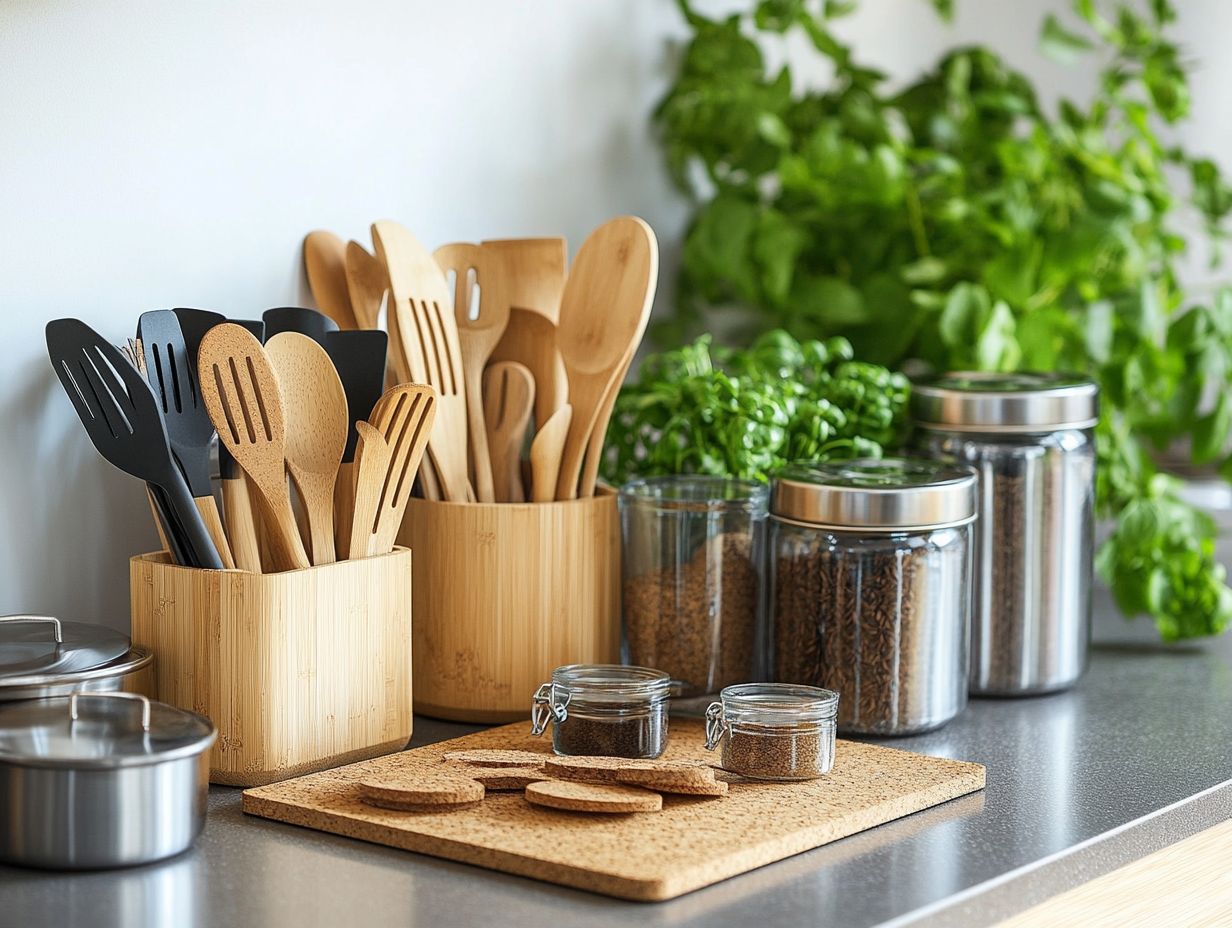
Stainless steel is a top choice for kitchen accessories due to its incredible durability and resistance to corrosion. This makes it ideal for reusable containers and eco-friendly utensils.
Choosing stainless steel also helps reduce waste by eliminating single-use plastics. It enhances food safety because it won’t change the taste of your food. The lifecycle of stainless steel is impressive; it can be recycled indefinitely without losing quality, which significantly minimizes its environmental impact.
When you choose stainless steel, you make a bold statement for the planet! Its longevity reduces the need for frequent replacements, curtailing waste generation. With these outstanding attributes, stainless steel becomes a conscientious decision that aligns with your commitment to environmental responsibility.
5. Reclaimed Wood
Reclaimed wood is a sustainable choice that enhances your kitchen’s aesthetic. It reflects a commitment to ethical production and waste reduction by giving new life to existing materials.
This versatile resource can be integrated into various kitchen fixtures, such as cabinets, countertops, and islands. It adds unique character and a rich history to your space. By selecting reclaimed wood, you contribute to environmental conservation, as it requires less energy-intensive processing than new materials.
Incorporating these eco-friendly options helps lower carbon emissions and promotes sustainability. Choosing reclaimed wood sends a powerful message about the importance of conserving our planet.
Why Should We Use Sustainable Materials in Our Kitchen?
Utilizing sustainable materials in your kitchen is essential for minimizing the environmental impact of traditional kitchen products. Incorporating sustainable kitchen accessories for everyday use supports a more eco-conscious lifestyle that contributes to the fight against climate change.
This approach encourages healthier living by reducing exposure to harmful chemicals often found in conventional materials. It also benefits the planet by limiting resource depletion and greenhouse gas emissions.
By choosing sustainable options, you play a vital role in a circular economy, where materials are recycled, reused, and repurposed. This leads to improved waste management practices.
Sustainable kitchen products often enhance energy conservation through better insulation and efficiency. This ensures your cooking and storage are environmentally friendly and cost-effective in the long run.
Embracing these choices fosters long-term kitchen sustainability, benefiting both your household and the broader ecosystem.
What Are the Benefits of Using Bamboo in Kitchen Accessories?
Using bamboo in your kitchen accessories offers numerous benefits, including its renewability and biodegradability, with minimal environmental impact. It’s a top choice for anyone seeking sustainable home accessories in their kitchen solutions.
The lightweight nature of bamboo makes it easy to handle and reduces transportation emissions. Its versatility allows for a variety of products, from cutting boards to utensils, helping you ditch single-use plastics for eco-friendly alternatives.
By embracing bamboo, you significantly contribute to waste reduction efforts. These sustainable options decompose naturally, returning valuable nutrients to the soil. Plus, as bamboo products gain popularity, you’ll be part of a movement advocating for eco-conscious practices.
Inspiring others to make environmentally responsible choices in their homes starts with you!
How Can Cork Be Used in Kitchen Accessories?
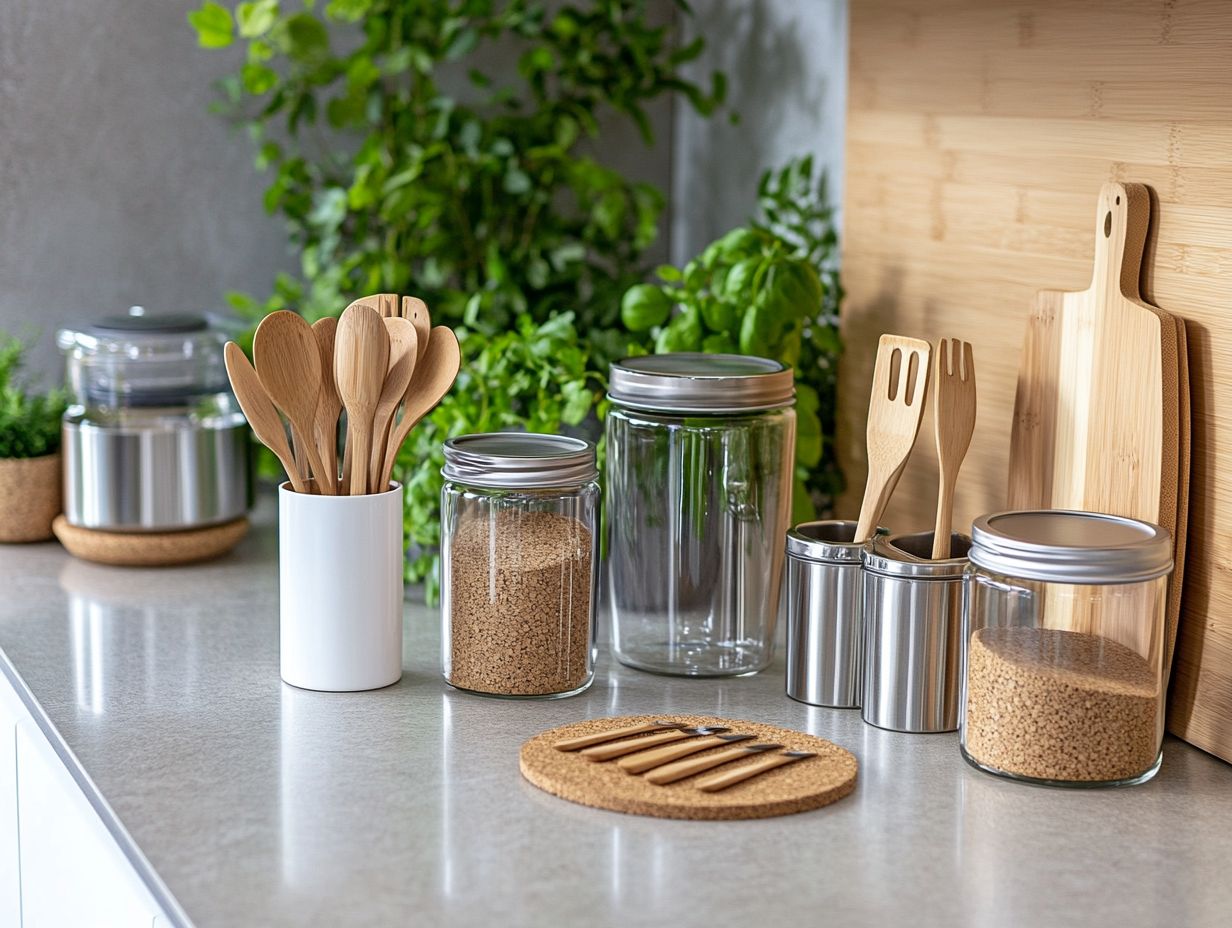
Cork can be integrated into various kitchen accessories, such as countertops, coasters, and food storage solutions. These sustainable products elevate both functionality and aesthetic appeal.
This natural material has warmth and charm and is a safe alternative to synthetic materials often found in kitchenware. Its inherent insulation properties keep temperatures in check, making cork trivets and pot holders effective at protecting your surfaces from heat damage.
Transform your kitchen with cork storage containers that enhance air circulation. This keeps produce fresher for longer and significantly reduces food waste. By choosing cork items, you re opting for style and practicality while actively contributing to the reduction of plastic waste in your kitchen, embracing a more sustainable lifestyle that benefits both your health and the environment.
What Are the Advantages of Using Recycled Glass in Kitchen Accessories?
Recycled glass offers numerous advantages when used in kitchen accessories. Its durability, food safety, and role in reducing plastic waste make it an exceptional sustainable kitchen solution, complementing trending kitchen accessories for modern homes.
This material is also safe for food storage, posing no health risks when in contact with your food. This safety, combined with its recyclability, aligns perfectly with the values of eco-conscious individuals who prioritize sustainable living.
By choosing products made from recycled glass, you not only reduce your carbon footprint but also contribute to a healthier planet. Selecting glass over plastic showcases your commitment to environmental sustainability, ensuring your kitchen decisions pave the way for a greener future.
Why Is Stainless Steel a Sustainable Choice for Kitchen Accessories?
Stainless steel is an exceptional choice for your kitchen accessories due to its remarkable longevity, recyclability, and resilience in harsh environments. This material plays a significant role in waste management, making it a responsible option for eco-conscious consumers.
Stainless steel also brings a sleek, modern aesthetic that many home chefs love. It enhances both the functionality and visual appeal of your culinary space, creating an inspiring atmosphere.
With its natural resistance to rust, stains, and corrosion, your kitchen tools and appliances will retain their performance and appearance over time. This means fewer replacements, saving you time and money.
By opting for stainless steel products, you’re investing in durability and championing eco-friendly practices. This material can be melted down and repurposed indefinitely, helping to minimize the demand for new raw materials and significantly lower your carbon footprint. This holistic approach to sustainability ensures a cleaner, healthier environment for you and future generations.
How Can Reclaimed Wood Be Incorporated into Kitchen Accessories?
You can creatively use reclaimed wood in kitchen accessories, from cutting boards to shelving and cabinetry. This sustainable option enhances your kitchen’s charm while promoting ethical production, and you can explore 5 ways to integrate sustainable materials in decor for more ideas.
These pieces carry a rich history and character, showcasing unique grains and textures that make stunning conversation starters. Integrating reclaimed wood into your culinary space cultivates a stylish, rustic atmosphere while supporting environmental sustainability by reducing the demand for newly harvested timber.
Utilizing materials that might end up in landfills demonstrates your commitment to eco-friendly practices. Whether you choose a beautifully crafted wooden island or decorative wall accents, the versatility and warmth of reclaimed wood make it a preferred choice for blending functionality with sustainability in kitchen design.
Frequently Asked Questions
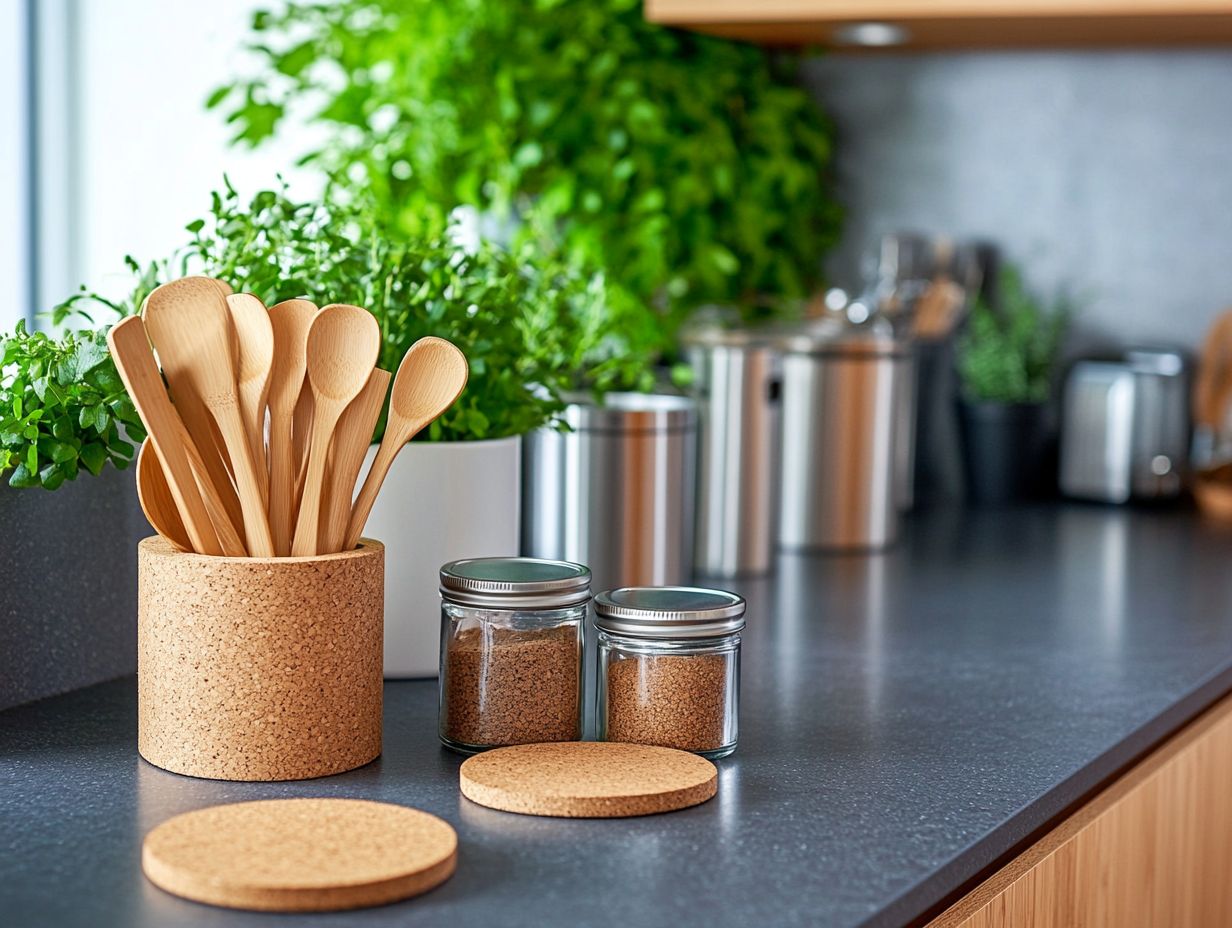
Curious about sustainable materials for your kitchen? Here s everything you need to know!
What are 5 sustainable materials for modern kitchen accessories?
The five sustainable materials for modern kitchen accessories are bamboo, recycled plastic, reclaimed wood, organic cotton, and cork.
Why is bamboo a sustainable material for modern kitchen accessories?
Bamboo grows quickly and requires minimal resources. Plus, it breaks down naturally when disposed of.
How is recycled plastic used in modern kitchen accessories?
Recycled plastic transforms into kitchen items like cutting boards and utensils. Melting it down reduces waste in landfills.
What makes reclaimed wood a sustainable choice for modern kitchen accessories?
Reclaimed wood comes from old buildings or furniture. This exciting choice helps save our forests!
Why is organic cotton a good material for modern kitchen accessories?
Organic cotton is grown without harmful pesticides. It uses less water and energy than conventionally grown cotton.
How is cork used in modern kitchen accessories?
Cork makes great coasters, trivets, and cutting boards. It s harvested from cork oak trees, allowing them to regenerate.

